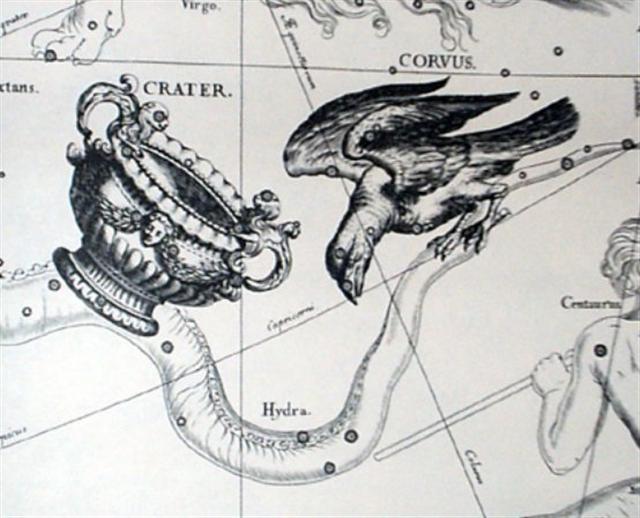Half a year from March 21 the heliacal rising of the Corvus constellation coincided (in rongorongo times) with the beginning of the 13th right ascension hour:
The Azzubra and Assarfa manzils, from September 25 to October 20, have no ruling stars (or constellations). For the Arabs, living north of the equator, this time of the year meant vanishing light, it was the time of Al Gorab (the Raven):  ... After the great flood had at long last receded, Raven had gorged himself on the delicacies left by the receding water, so for once, perhaps the first time in his life, he wasn't hungry. But his other appetites, his curiosity and the unquenchable itch to meddle and provoke things, to play tricks on the world and its creatures, these remained unsatisfied. Raven gazed up and down the beach. It was pretty, but lifeless. There was no one about to upset, or play tricks upon. Raven sighed. He crossed his wings behind him and strutted up and down the sand, his shiny head cocked, his sharp eyes and ears alert for any unusual sight or sound. The mountains and the sea, the sky now ablaze with the sun by day and the moon and stars he had placed there, it was all pretty, but lifeless. Finally Raven cried out to the empty sky with a loud exasperated cry. And before the echoes of his cry faded from the shore, he heard a muffled squeak. He looked up and down the beach for its source and saw nothing. He strutted back and and forth, once, twice, three times and still saw nothing. Then he spied a flash of white in the sand. There, half buried in the sand was a giant clamshell. As his shadow fell upon it, he heard another muffled squeak. Peering down into the opening between the halves of the shell, he saw it was full of tiny creatures, cowering in fear at his shadow ...  The star Minkar (ε Corvi, at the beak) arrives 16½ weeks after Aldebaran, (183.7 - 68.2) / 7 = 16½:
From the Crater issues a liquid creating a great flood, which accumulates down where the bivalves are interconnected. This is where mankind was created. One might thing Raven would use his beak to pry open the bivalve. However, he had other means and the time was not right, it was not 'dawn': "Raven was delighted. Here was a break in the monotony of the day. But how was he to get the creatures to come out of their shell and play with him? Nothing would happen as long as they stayed inside the giant clamshell. They were not going to come out as long as they were so afraid of him. So Raven leaned over his head, close to the shell, and with all the cunning and skill of that smooth trickster's tongue, that had so often gotten him in and out of so many misadventures during his troubled and troublesome existence, he coaxed and cajoled and coerced the little creatures to come out and play in his wonderful shiny new world. As you know the Raven has two voices, one harsh and strident, and the other which he used now, a seductive, bell-like croon which seems to come from the depth of the sea, or out of the cave where winds are born. It is an irresistable sound, one of the loveliest in the world. It wasn't long before first one and then another of the little shell-dwellers emerged from the shell. Some scurried back when they saw the Raven, but eventually curiosity overcame their caution and all of them had crept or scrambled out. Very strange creatures they were: two legged like Raven, but otherwise very different. They had no feathers. Nor fur. They had no great beak. Their skin was pale, and they were naked except for the dark hair upon round, flat-featured heads. Instead of strong wings like raven, they had thick stick-like arms that waved and fluttered constantly. They were the first humans ..." |









